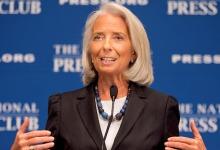
Typical street scene in Santa Ana, El Salvador. (Photo: iStock)
IMF Survey : Stay Focused on Policies for Jobs, Growth—Lagarde
January 15, 2014
- Global momentum strengthened in late 2013, set for further gains in 2014
- Big priority in 2014 is for policymakers to fortify feeble global recovery
- World could create lots more jobs before needing to worry about inflation
Optimism is in the air, but conditions point to the need to stay focused on the policies needed for sustainable growth and rewarding jobs, IMF Managing Director Christine Lagarde said.

Lagarde: horizon is brighter, but getting beyond crisis still requires sustained, substantial policy effort, coordination, right policy mix (photo: Stephen Jaffe/IMF)
GLOBAL ECONOMY IN 2014
She told a Washington D.C. audience January 15 that the world economy had avoided a worst case scenario thanks to the efforts of global policymakers over the past half decade.
In remarks at the National Press Club in the U.S. capital, Lagarde said global growth momentum had strengthened in the latter half of 2013, and should strengthen further in 2014, largely due to improvements in the advanced economies.
“Overall, the direction is positive, but global growth is still too low, too fragile, and too uneven,” Lagarde stated. “It is not enough to create the jobs for the more than 200 million people around the world who need them.” In far too many countries, she observed, the benefits of growth are being enjoyed by far too few people.
Lagarde said 2014 will be a milestone year. It will mark the hundredth anniversary of the start of the First World War, the 70th anniversary of the Bretton Woods conference that gave birth to the IMF, and the 25th anniversary of the fall of the Berlin Wall.
“It will also mark the seventh anniversary of the financial market jitters that quickly turned into the greatest global economic calamity since the Great Depression,” she noted.
“Optimism is in the air: the deep freeze is behind, and the horizon is brighter,” Lagarde said. “My great hope is that 2014 will prove momentous in another way—the year in which the ‘seven weak years’, economically speaking, slide into ‘seven strong years.’ ” But, she added, getting beyond the crisis still requires a sustained and substantial policy effort, coordination, and the right policy mix.
Rising risks of deflation
For the advanced economies, the outlook is subject to significant risks, Lagarde said. With inflation running below many central bank targets, there are rising risks of deflation, which could prove disastrous for the recovery. “If inflation is the genie, then deflation is the ogre that must be fought decisively,” Lagarde said.
She noted that, during the years of financial crisis, emerging markets had kept the global economy afloat. Together with the developing countries, they accounted for three-quarters of global growth over the past half decade.
But a growing number of emerging markets are slowing down as the economic cycle turns, and there are risks arising from financial market turbulence and the volatility of capital flows.
Fortify global recovery
Global growth is still stuck in low gear, and remains below its potential rate of around 4 percent, Lagarde said. “This means that the world could create a lot more jobs before we would need to worry about the global inflation genie coming out of its bottle.”
Lagarde said the global situation points to one imperative: the need to stay focused on the policies needed for sustainable growth and rewarding jobs. “The big priority for policymakers in 2014 is to fortify the feeble global recovery and make it sustainable.”
For the advanced economies in particular, central banks should return to more conventional monetary policies only when robust growth is firmly rooted. Countries need to use the room created by unconventional monetary policies to put in place the reforms needed to jumpstart growth and jobs.
• In the United States growth is certainly picking up, driven by private demand and helped by the loosening of the fiscal corset in the recent budget deal. Still, it will be critical to avoid premature withdrawal of monetary support and return to an orderly budget process.
• The euro area is turning the corner from recession to recovery, but growth is still unbalanced, and unemployment is still worryingly high. Governments should accelerate reforms to boost labor market participation and enhance competitiveness.
• In Japan, the challenge is to agree on medium-term fiscal adjustments and social and economic reforms needed to strengthen growth.
Emerging market policymakers must be wary of any signs of financial excess, especially in the form of asset bubbles or rising debt. They should strengthen and implement financial regulation so that they can better manage credit cycles. Many also need structural reforms to unlock their growth potential.
Low-income countries should build stronger defenses against either direct or consequential external shocks, including by raising more revenue. They should also keep spending selectively on important social programs and infrastructure projects.
Spirit of cooperation
Recalling the multilateral impetus behind the founding of the IMF, Lagarde said that to move forward, the world needs the same spirit of cooperation and global solidarity today. The IMF can play an especially valuable role as a forum for precisely this kind of cooperation, she stated.
“We have certainly played our part in the collective response to the crisis—making 154 new lending commitments and providing technical assistance to 90 percent of IMF members since the onset of the crisis in 2008, and providing the best possible policy advice.
“One of our strengths is that we have to look at the bigger picture—how all the moving parts fit together, how what happens in one country affects the wider global economy,” Lagarde said.


